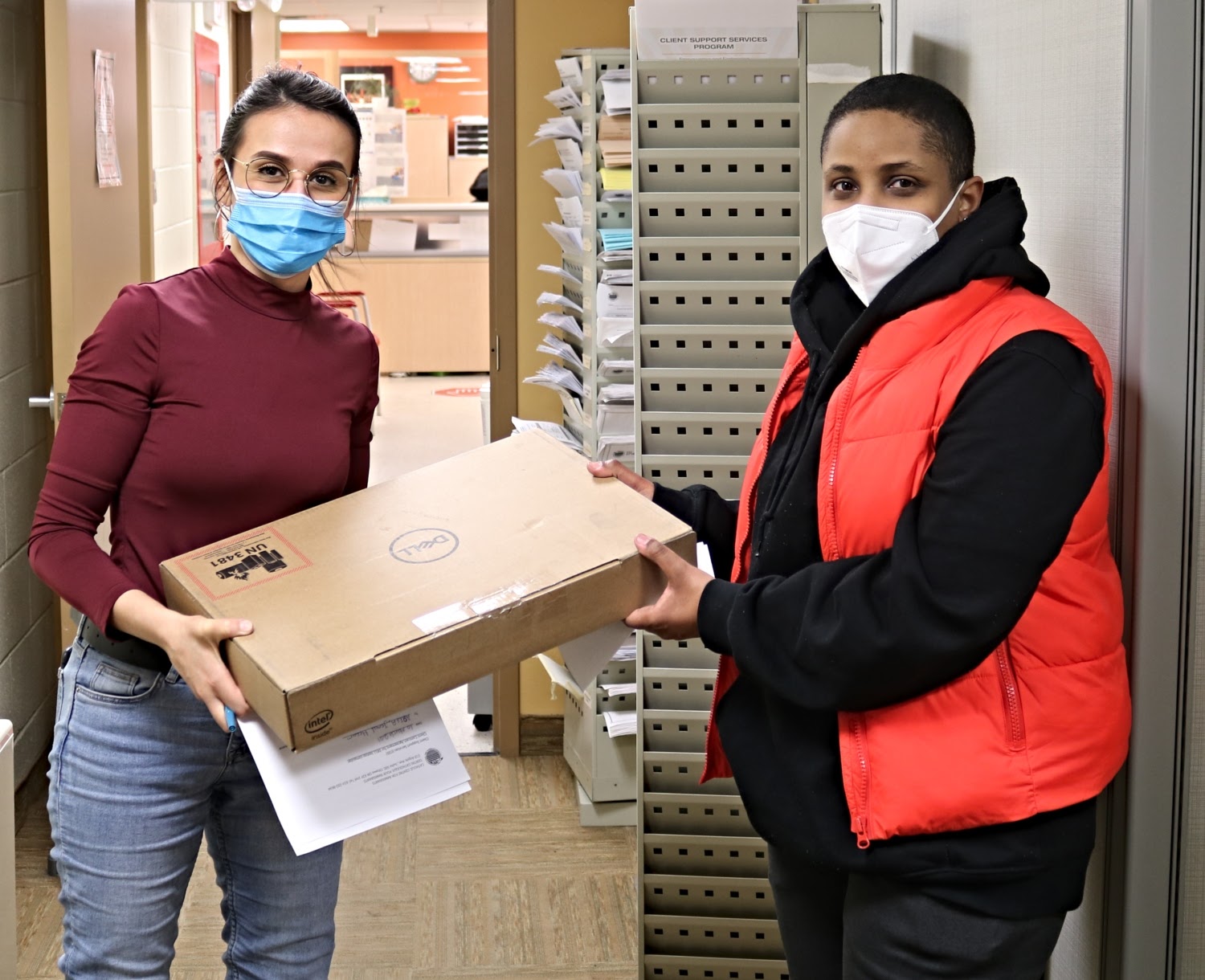Community organizations have had to change how they deliver services in a pandemic but are finding ways to maintain important personal connections with the vulnerable groups they serve. A closer look at how two medium-size community organizations in Ontario have adjusted their services remotely offers insight into what a hybrid service might entail now and in the future.
Based in Ottawa, the Catholic Centre for Immigrants (CCI) has been welcoming immigrants and refugees to the city since 1954. When the pandemic began, the organization grappled with how to deliver services remotely and was concerned about a potential drop-off in funding.
“Initially, we were worried. But the community stood behind us. We were clear on what we needed. We continued to reach out to them through e-newsletter, regular mail and social media. At the end of the year, we were pretty much (financially) where we expected to be,” says Don Ermen, communications coordinator for the CCI.
On average, CCI Ottawa serves more than 7,000 newcomers a year. The number decreased with COVID-19, but not the work.
More help required
“Canada was bringing in fewer refugees and immigrants but we got busier with our existing clients needing additional help to cope with the pandemic,” Ermen says.
Initially, the centre’s clients were anxious, unsure of what they could do. Some lost their jobs or found it harder to find work. Their children had to adjust to online learning. For those who didn’t speak English or French well, it was very difficult to understand the new lockdown restrictions.
“For those who had relied on coming to our office, it was a challenge to connect with us because they either lacked the digital tools (like computers, tablets or phones) or lacked the knowledge on how to use them.” Ermen says that’s when CCI stepped in to distribute 150 donated laptops to facilitate their clients’ access to online services.
Not everyone was comfortable with zoom or using email, but things have improved, says Ermen. He also notes that CCI still does a lot of assistance over the phone. “I think for people who are comfortable in the online world, the feedback is positive. But there are still some people who would rather meet with a counsellor in person,” says the CCI coordinator, noting that the agency still has clients who show up at the office, not understanding why offices are closed.
Most services are now online including a program called Conversation Circles. Before the pandemic, the organization operated three circles a week. Newcomers would come in and practice their English or French. Now all of that is delivered online and interest has grown. CCI now hosts 12 circles a week.
“Many connect from home. No need to have to find parking, or take a bus, or deal with cold weather.” Ermen projects that even post-pandemic, CCI will likely continue to keep some services online. But he acknowledges that it’s been a challenge to deliver sport and recreational programs to youth online.
Impact on Children’s Aid Foundation
Operating in another corner of the province, 500 kilometres south of Ottawa, The Children’s Aid Foundation of Halton (CAFH) experienced the same financial angst when the COVID-19 lockdown began a year ago.
The lockdown last March happened just weeks before a scheduled fundraising gala, which CAFH was able to move online.
“Fortunately, we had collected items to auction off and were able to put them on an electronic platform,” says Tina Blatchford, CAFH’s Executive Director. The downside was that the organization only managed to raise only about a third of its usual donations. “Given the circumstances, we consider that a success!”
To make up for the shortfall, CAFH applied for government grants, while other large corporations stepped in, helping the organization pull through.
Youth services hurt by loss of social interaction
In Ontario, Children’s Aid Societies (CAS) have the exclusive legal responsibility to provide child protection services 365 days a year, 24 hours a day. When the pandemic was declared CAFH had to continue its work as an essential service. The staff was sent home to work remotely, but soon referrals stopped coming in.
“Before the pandemic, majority of calls or referrals were from the schools. With schools closed it got very quiet for a couple of months,” said Blatchford.
She notes that it took a few months before issues started to bubble up and we started to receive more calls from parents, children, and neighbors. An added challenge for the organization was access to the sites. When screeners receive calls for a child in need, a social worker is assigned to visit their home and investigate. In a pandemic, children’s aid workers had to wear proper personal protective equipment (PPEs) and get training in accordance with safety protocols. “In some situations, in some of the homes that we go to, they are not very clean at times. With pandemic, extra care needs to be taken,” Blatchford observes.
The CAS of Halton serves about 5,000 children and youth each year, of which 97 per cent remain with their parents or relatives and about 3 per cent are from foster homes. Arranging supervised access visits was a big headache for the CAS in the first stages of the pandemic. The Society has children in foster care and ordinarily, it arranges meetings between these children and their natural parents in its offices, as mandated by the courts. With lockdown, those meetings were among the first to be cancelled but also the first to resume after the first wave of the pandemic. Remote meetings cannot replace face-to-face meetings in such cases.
But where it was able, CAFH, like the Catholic Centre for Immigrants, mobilized to get its clients online. It distributed about 110 refurbished computers to its clients, primarily youth. Their “at-risk youth” ages 16-24 live alone and are estranged from their families.
The youth programs have been hurt the most. Before the pandemic, participants from that group would get together about three times per week and engage in recreational activities ranging from skateboarding to basketball. With the lockdown that became difficult to pull off. To fill in the gap, the organization introduced activities and speakers online, curbside food and perishables drop-offs and increased the distribution of gift cards for groceries.
CAFH started an online art talent contest and created entrepreneurial events. With more variety online, attendance started to pick up.
“Now we are getting pretty much 100 per cent participation rate in our events,” says Blatchford. She also believes that once the pandemic ends a lot of virtual activities will continue. What won’t change is the organization’s commitment to bringing a human touch to families in difficult circumstances.
This story has been produced under NCM’s Advanced Mentoring program led by Professor Susan Harada and Judy Trinh.
Naser Miftari is an independent media researcher. His broad area of interest is in political theory and his research focus is on the future of public broadcasting, media governance and political economy of communication. For more than ten years he was a writer and editor for Koha Ditore one of leading newspapers in South East Europe. He is an active contributor in media research studies and has also taught graduate and undergraduate courses in media and political science at colleges and universities in United States and South East Europe. More recently he served as a contributor on global journalism issues with the Toronto-based Canadian Journalists for Freedom of Expression (CJFE) and in 2016 he was a research fellow at King’s College in New York.





